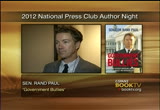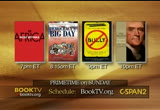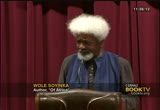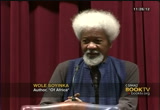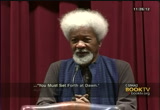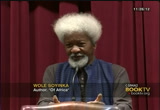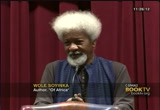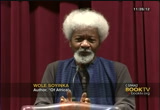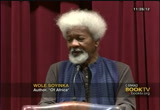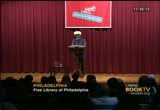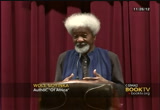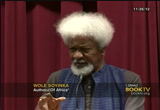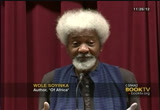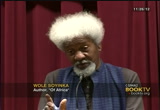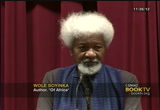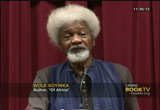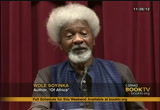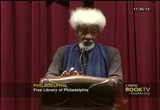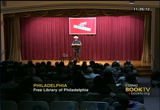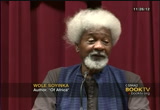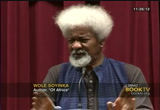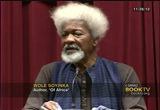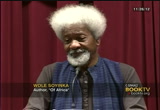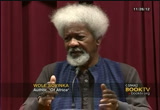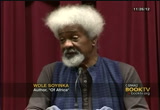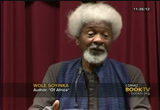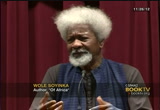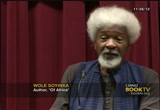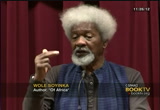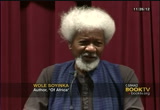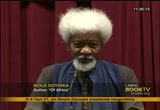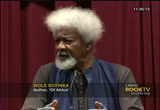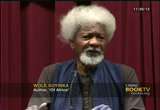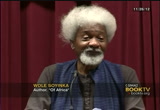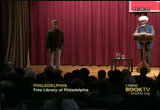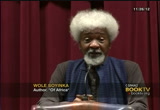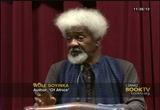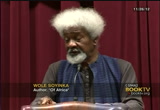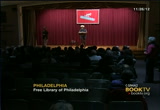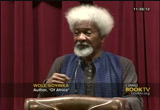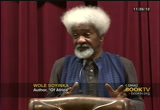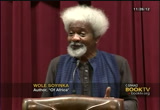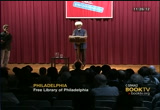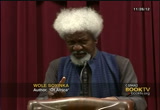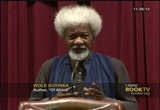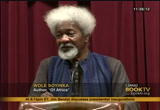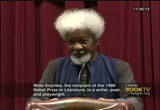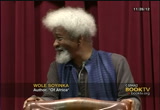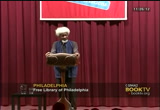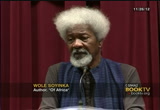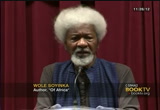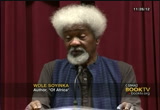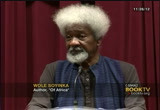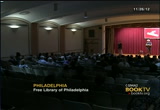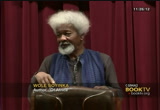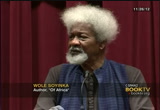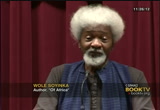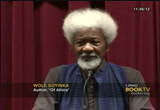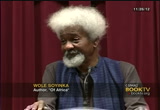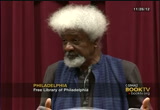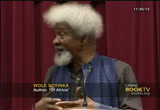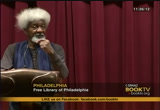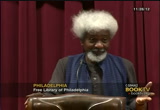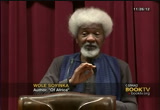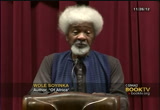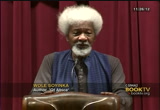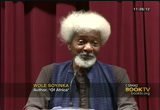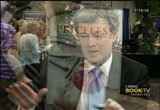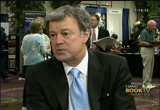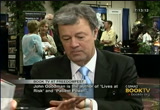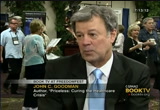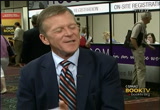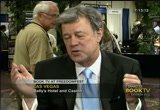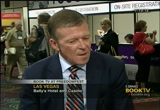tv Book TV CSPAN December 16, 2012 7:00pm-8:15pm EST
7:00 pm
7:01 pm
>> up next, wole soyinka talks about the history of africa and the challenges facing the continent today. this is about one hour and 10 minutes. [applause] >> thank you very much. thank you, thank you. thank you and good evening. i hope that you are not expected a formal lecture. this is to be a conversation. a few minutes ago and i know that some people were expected a formal lecture, but it doesn't matter. we will have a conversation.
7:02 pm
let me make some introductory remarks about the books. and let me ask introductory question why this book, "of africa", why did it come it come about? why did i write it? >> i did not write it for anything but a continuing example of the discourse going on in africa. anyone who would like some immediate instances of the encounters that have been lived inevitably, anyone taking down notes on the subject matter of the book, which tries to cover a wide range. let's take the religious side. i saw on the wall imposter.
7:03 pm
the title was a lecture. it was the greatest show on earth. above that i saw the god delusion -- the god delusion. it is very strange to think that in certain parts of the world today, it is a daring to put up such a poster. the author of such a book. you may be stoned to death or put to death for blasphemy. the second incident, i was speaking to a young lady. she was telling me about her experience. she had obviously read "of africa", and she was lamenting
7:04 pm
the prejudiced extremist, very intolerant prejudiced taking place among the various religions of the world. she said i grew up in the environment which was christian. people follow their christian religion. or their african superstitions. for me, ms. went to the heart of why the book became inevitable, or why, for me, it had told of the discourse i had seen all my life. it is very strange. i should actually exist in the environment in which, for believing what i believe or not believing what i do not believe, to consider whether what i call
7:05 pm
terminal issues. going back through my history, and i don't just mean personally -- i'm talking about the society in which i lived and was raised in the history of my people. the european explorers, of course, they were followed by religious storm troopers come in the christian missionaries who came to africa on a mission of conversion. we have a very serious problem. that was we could not find the devil, satan. now, if you want to convert people, first of all, you talk about their soul being in dire danger. the ultimate bonfire on the other side of existence. after that, you need to label
7:06 pm
them followers of the -- diabolical human beings. so they look for the devil. it is a very complex and elaborate religion. very well structured. they looked among the deities and they found isu. isu is an unpredictable spirit. isu exists and teaches humanity that there is always more than one side to an issue. one might face the reality.
7:07 pm
isu, the embodiment of the lesson. when they teach humanity about the following, they tend to do it in a rather painful way. you know, like a good teacher. symbolically, adults who have learned the wisdom of both sides of the question. different sides of the road, this is where human beings get confused. and it is so mischievous, the isu is not allowed in house. the house. he is not allowed in the house. his place is always at the doorstep. because isu at the house is always temperamental. before you do anything in the
7:08 pm
religion, before you warship any of the deities, you make should be set aside a morsel or isu. he is really the message of the deities. he is always truthful, but he may deliver the message in a way without line. and he could make you misinterpret the message. when the missionaries look at this among the other deities, the god of the water, isu is the most mischievous. so even in the new interpretation of the bible, each time, you hear it is isu.
7:09 pm
but isu is evil. on the contrary, on the compromise of our wisdom, from the ecology, the wisdom that is bound up versus the diviner. so isu is actually anything but a double. but it is very painful to find one so doing in referring to it as the devil. look at what happened when the slaves were moved to latin
7:10 pm
america. they arrived with the knowledge that isu was geared by the christian missionaries. the slaves adopted isu. they adopted isu as their patron deity. the christians who wanted them to convert. isu became the paramount symbol of resistance in latin america. in the americas. in fact, it went beyond that. in certain part, you will find that isu has been elevated to the supreme deity. simply because that was a symbol that was there. the protagonist for freedom. and we find transition across the atlantic. it became not only a symbol of resistance in the new world, but the supreme deity in certain
7:11 pm
parts of the world. on the contrary, if you go to the heartland in brazil, it is quite plain. but in certain other parts, isu became the supreme deity. now, consider today, this is the history in africa. and this goes back a couple of centuries. to be a follower of this religion, it is virtually to earn a death sentence in certain parts of nigeria. christians also in the a death sentence in certain parts of nigeria. many christians respond in kind.
7:12 pm
but the level of intolerance, based on ignorance, as which such where you open the papers anytime today in nigeria, uganda but the church has been burned down. worshipers have been killed by machine guns. buildings are bombed out of existence. even within this religion, there are different grades of purity. one side considers the other side not sufficiently deserving of terminal censorship. the institution is complicated. there is never one single issue that leads to total breakdown of
7:13 pm
society. politics entered into it. modernization, corruption, all of these are part of the growth in the widening of the area of fanaticism. when the politicians won't power, they have no scruples whatever. they utilize and they do utilize any differences, whether ethnic or religious. the growing principles of the sanction is religion. we have very strange political system. we are moving on to northern nigeria. sitting here in the library, we
7:14 pm
believe you all deserve terminal censorship. [laughter] >> schooling, anything at all having to do with -- anything outside of this. it is very easy to mobilize the youth who sit at the feet of the schools. they take orders from them. they believe that there is an end of instructions of the cleric. the politics of nigeria have been complicated simply because of something that the british did. they were not dissatisfied with creating dissension, that was not enough. there had to be dissension and
7:15 pm
division in the country. they created surrogates and naturally they wanted surrogates those who practice late into the 20th century. and so they not only falsified the elections that followed and preceded independence, they falsified even censorship. now, as we check the records of the so-called home office, which is where the colonies -- colonies have been administered -- we look for the book of
7:16 pm
harold smith, who is one of the civil service in nigeria at the time. he got into trouble because he did not carry out his orders. it was ordered that he participate in the falsification of the census. the southern part was considered very much a prospect. they were radicalized with western ideas. so they left it in the hands of the government. that led eventually to the very first village.
7:17 pm
there was a coup and a series of civil massacres, which led eventually to the secession of the eastern part. because they were the larger group of victims. and they were guilty for killing some of the other leaders. and so power was restored eventually by the counter trent ford to the north. eventually, up to the last dictator, to the service of god in the other world -- the next president in nigeria, he was a
7:18 pm
former military man who had been president who happens to be from the south. now, remember when the british left, the left power in the hands of them. [inaudible] the ruling party, however, inserted a principle, which is just the same as the british left behind. power to remain in the north. the expression of the time was that power was went to the south for a few years. it must revert to the north and continue the tradition. this is not very palatable. unfortunately, the president of the nation who took order left. he was a very sick man.
7:19 pm
for about six months, nigerians didn't know they were being ruled by a ghost or human beings. it is the god that we know, the drama that went on welcome of the addition was upheld. and within the ruling party, there was a southerner setting out after lots of turbulence and shenanigans going on -- he could
7:20 pm
be called a deputy president, he wanted power, anything but the constitution and essentially he took over as president. then he went on in his own life in the election. i know what elections are like, to the foregone conclusion that he became president. he was slipping away further and further from, you know you're in when i speak of this, i would like to emphasize that i am never talking about the internal. but i do talk specifically of a hard-core modernist. t. whom the very concept of to whom the very concept of democracy is complete of the ruthless who manipulate and insert themselves into the various crevices of society. i would like to ensure that it
7:21 pm
is in the hands of the most corrupt and encourage full individuals. so i do not use this expression frequently. but you are confronted by a very determined mafia, northern mafia, who has scruples about this. so this, his name is, [inaudible name], the president of nigeria, he is sitting there for four years. and then the rumblings began that he was going to go for a second term. now, they look at looked at what was happening and decided that it was time to ensure that there was no one who would teach about the last mistakes. in separate, the religious
7:22 pm
incitement said that thinking the region was in danger, that they take over power and stay there forever. they took off her training in somalia. they went to somalia and mauritania, and later on, some of them are just making them up, and a eventually they went to the religious movement in algeria and eventually became al qaeda. this is now an revolution, which reflects this. so there you have the volatile cocktail of politics and religion. because the motivation of the foot soldiers is to create an
7:23 pm
islamic state in nigeria. it is something that they dream of. there are videos. and a lot of rhetoric and fun yes, we want an islamic state. yes, one of their leaders went so far when the government was -- when political leaders were opposing amnesty and so forth, until we are willing to sit down and negotiate with him. we don't know what you want, and i said, don't be stupid, we know very well where their motivation is. that is the reason for the devastation of the north today. the country in which years of
7:24 pm
independence, certain sections of the country consider non-muslims, whether christians or non-muslims -- they consider them disposable material. an interesting thing happened. some of these were sent out and then came back holier than their masters. and it looks to their mentors. some of them on private jets. this is not the kind of thing that we were taught. so it became complicated by the fact that the mentors became some of the frontline people.
7:25 pm
but its churches and schools, institutions, libraries and the like -- the media, and that includes communication. they realized that they couldn't communicate, but they are taken down half a dozen of those before someone said listen, and so all of this, the whole sense of religious natures, where some
7:26 pm
religions considered more valid than others? is it ignorance, which we know exist, and even among insiders were their own people. and i collect certain instances of this and so on, and one man was one who had a big collection that you can only imagine. a worker came to his house one day. he was an electrician and said, okay, the problem is upstairs. so they went upstairs. a few seconds later, this man came down screaming, in the name of jesus, the god of jesus -- this shall not try him. and everyone is looking at him like, what is the problem?
7:27 pm
they talked about the various deities, and the works of art. because they were looked upon by the council as works of the devil. these encounters on the comic and absurd level, the tragic level, which really is where we are today. were these holy warriors -- one person went to the school, they took the trouble to penetrate and collect a list. and they called on the students one by one.
7:28 pm
7:29 pm
7:30 pm
one of these conferences, following the religions, so on and so forth, shortly after the film was made by those in the united states. this, of course, yet again, this led to killings all over the world. everyone backing down and the question i always ask myself, why is it that anyone religion considers that it is so sacrosanct. either through film or theater or through song. it is subject to public comment. it is a continuation it has
7:31 pm
7:32 pm
correctness. it is slightly excuse for the most immoral conduct. that seems to be crippling the democratic world, other than the ethical world of most people. it is something that is in africa. africans have been suffering from the very incursion of the early missionaries and explorers, they are not considered religious. they are not considered worthy of being defended in any way. those religions aboard forgiveness for becoming compulsive as a spokesperson.
7:33 pm
you'll have to forgive me. we are going against their principle. thank you. i will stick to the time i have promised two hello, ladies and gentlemen. raise your hand, and we will get a microphone to you. if we could start to this gentleman, and the wardrobe here. if we could start with this gentleman in the fourth row here. >> i would like to commend you for being one of the most articulate spokesman for human rights that we have here today. [applause] i would like your take on the report that i saw yesterday on cnn, that there is pending legislation in nigeria to outlaw
7:34 pm
sexuality, and then go on to reflect that by interviewing for by people in the street, but it reflects the majority opinion of the citizens of the country to well, okay. in the nigerian media, in response to this -- this legislative adventure. it was first needed sometime last year. you know, people may be responding end somehow we followed it until it resurfaced a few weeks ago.
7:35 pm
7:36 pm
a senator who imported an under age girl from egypt, literally brought the squirrel from her father, who was a driver, he brought her from egypt, he he married her, he said sent the girl back to school. a lot of egypt definitely for bid this underage marriage. they prevent this kind of conduct. it turned out that this was a serial pedophile. he marries them young, then discards them, then marries another one. many screaming their heads off. the other prosecutor claimed that anything that is that i
7:37 pm
shouldn't do, i will be. and so he picked up an underage girl from school, taking laws of the two country, he felt that his laws were superior to the constitution. so they have no moral authority. >> are there any other questions? >> thank you. most countries are compared it with developmental religion are
7:38 pm
now. many have developed superior standards. [inaudible] in regards to christianity and islam. if you look at this generally, the issue is, they seem to be more proper and developed as christians and i would like your comment about that. >> okay, i just lost a? >> [inaudible question] >> okay. i believe that religions are problematic of an issue. very problematic. fortunately, those who are immersed in their own religion, they are also culturally tied to their roots.
7:39 pm
it is only when you are culturally rooted that it is created. not only with humanity, but scientifically. japanese get their religion, you can see how far advanced they have been into the sciences. the chinese have religions. [inaudible] one of the things that i forgot to mention with christianity when the slaves went to the americas, [inaudible]
7:40 pm
it substituted for the deity. you will find this, as this letter is. saint anthony, the religious right of the candles, and etc. and etc. even involving a means of retrieving images of their beauty. slightly stylized, so that they could claim that those students thought the things about how to accomplish the work in creating human beings. also, there was another phase, which is very prominent.
7:41 pm
there was a time where basic christianity, go away. your religion is your religion. and they worshiped with in the liturgy, and then it was a very competent thing. but religion is a very competent thing. >> thank you. moving on to a question in the front row here. >> hello, professor wole soyinka. as a second-generation consumer of this culture, i find myself represented -- >> i'm sorry, i lost most of that -- >> being a consumer of the year of a culture, raised in nigeria, but here, my mom was a student of yours. but since then, we, the children come have only consumed it in
7:42 pm
the form of fiction. yet, you actually made a statement where as long as we continue to fictionalize the events and experiences of africans, we are doomed to repeat the kind of repetitions that perpetuate the scene. can you comment a little bit on how we, as this young generation can reconnect to the essence of our culture that allows us to carry on and regain something that we have lost. >> the question you have to ask yourself is what religion do you
7:43 pm
feel attached? if you are christian, if you are christian, then stay christian. if you go muslim, you know, you have the right in the united states to pursue that. i know of a number of people from the caribbean and the americas, who had me over to his home to find out what is the essence of the deity, which tt represents what we feel inside as spiritual beings. whether we are religious or not, all of us are spiritual beings. many people have the structuring of that spiritual feeling. so it is tied to religion. i find all religions equal.
7:44 pm
all religions have something to offer humanity. , whether it's in the nature of music were beautiful architecture. cathedrals, mosques, shrines, the models of human creativity. music and descriptors can make fascinating reading. whether it is accepted or not. the arguments that go into building this can be very limited. from that point of view, i don't think we should compare ourselves to follow this or that religion because we come simply from africa. he would be losing something if you didn't make the inquiry and see what is there. the comparative attitudes.
7:45 pm
start following your head and heart. >> any other questions? >> can you talk about jonathan and where his name came from? >> i'm sorry? >> [inaudible] >> oh, okay. jonathan. one of the things we are very good at in nigeria is names. well, the most fascinating of names, it begins from the beginning. it means good luck, goodwill, blessings -- there is one name that i absolutely refuse to call, his name is sweetheart. [laughter] i don't know you, you are not my sweetheart. give me your traditional name.
7:46 pm
that's one i am going to use -- i will never call you sweetheart. many of these names are translated in yerba, [inaudible] some are derived from english. so you say, what do i want to do, what is the name that i want -- and they just give the name. and he was called good luck. heaven knows what happened, there wasn't much lottery at the time. but i think many nigerians don't feel that -- well, anyway. >> okay. the gentleman off to our left.
7:47 pm
>> i read your book many years ago. it was called the open sore of the continent. speaking specifically about the execution of king charles and the kind of disparity of the death penalty in nigeria, as compared to the political execution and hundreds of enemies that would languish many years, even though this is not completely outlawed in nigeria, the issue of killings going on in some parts of nigeria, so-called suspects in public
7:48 pm
places and masses in some places yes, that is one huge block on the nigerian history. it is under military dictatorship, as you remember. a particularly brutal british kind. some people were killed, brutally killed by some of the militants. those in the south. there was absolutely no evidence of what was going on in it.
7:49 pm
you saw fear in the populace. but only if you organize an injustice, but you do it in the face of international protest, appeals, the dictator says i can do it, and therefore i will do it. and the rest of you better take care. i can do it to the rest of you. that is the principle -- a very abysmal principle and mindset. the situation, i should mention, i have also been seeing these issues be compounded by a similar attitude on the part of the joint task force.
7:50 pm
it is a kind of attitude which has led to the killing of innocent people killing of innocent people in the north. unfortunately, this is something which nations undergo time and time again whenever confronted with a terrorist movement. there is no way to describe it. many muslims have actually come to denounce them, even those who were the champions of the region, and religion. quite a number of them come around to understand that it is a sacrifice.
7:51 pm
those that are completely wrapped up in their religion. but it is perfectly normal to kill in the name of religion. justifying killing. it is like a type of identity or preferment in the eyes of the deity. it is to kill. to kill in the most gruesome way possible. so unfortunately, it is a situation in which a situation has to be a mixture of political handling and a strong security intelligence. >> greetings. i want to thank you for your counsel. it is important, along with two other recent books by african writers, the first [inaudible
7:52 pm
name] and the second being [inaudible] as an african in america, the impulse look to the continent as the source for our spiritual being, the source not only to survive, what has happened in the western hemisphere, it has always been there. one of the things that [inaudible name] does is compare the impulse to africans on the continent who have, in many way, block that tradition. so the question is for me, the preservation of these traditions, how do we, as africans throughout the world, in the face of an arab world
7:53 pm
7:54 pm
what we're talking about is the cultural armory. i'm not sure if many african-americans realize this. many took to the african culture. various cultures of the african continent, so that they are academic and they go beyond the symbolism. very profound material. it is necessary to query into the spirituality of any society. in order to be able to talk about the valuable cultural weaponry within the society. i am impressed by the
7:55 pm
consistency in which the kwanzaa , the season that is celebrated and it is coming up again in december of this year, it is a move in the right direction. but i think that a lot of depth is required in the approach of african-americans. the only way to do it is not just in the classroom. it is also to seize the opportunity of visiting africa. the real africa. but the french africa. nor the air of africa. not the british africa. but there are places on the african continent, whether they have been to certain areas or not, they can say that they can feel and smell and taste africa.
7:56 pm
to go there and sit at the feet of the leaders, the cultural leaders, spiritual leaders, just to expose yourself, it is almost like a kind of osmosis in which you actually invite the totality -- you understand for a change, the comprehensive nature of the cultures which animates such a society. and from which the artists, the architects, not the soufflé, opportunistic slogans, all that kind of thing, the rhetoric for the personality. no, it is just among the people.
7:57 pm
when you find in there and come back, you convey the essence. in other words, it can be done. and then of course, you have no feeling for it. when he came looking for his african roots, it was a disaster. he said that he didn't longer. he looked at the magnitude and all that was africa. and he abandoned hope at the end. but to go into it and exposing it. >> just to clarify this point, doctor wole soyinka, you are not
7:58 pm
saying that the urban grounds are going -- you are saying that within africa those influences are openly part of this? >> are you saying that he of incompatibility of our culture? >> i'm not saying that, i am saying that i think the gentleman misconstrued what you're saying in the book. >> okay. >> not that the west is -- within africa, i thought, in the book, that you were talking about the african spirit. >> yes, very different. this is something which we must stress. i don't consider, culturally speaking, i don't consider that the arab world is identical with the african world.
7:59 pm
i believe that most arabs further culture because they believe it is very unique. some of them believe they actually articulate their experience. what happens is the political manifestation. it doesn't mean they are the same. the important thing is to coexist on an eagle carrying basis. the suggestion of superiority, that is one it begins. there is nothing more interesting than the fusion of cultures where they can view his end the synthesis can emerge. probably the most innovative jazz musician took muslim black
8:00 pm
africa and produced beautiful music. another african musician was most impressive. documenting what he is going to do along the melodic lines from the air world and from his own african continent. so there are many levels in which all cultures interlock one way or the other. including the europeans and africa. ..
8:01 pm
what is your feeling about this issue will of reparations been paid to people of african descent in the americas for their enslavement? >> certainly i know somebody i can prescript buy my book. [laughter] because i talk about reparations. the first one is i don't know how long it will take about the loss is the loss of the european world. where we take up arms figuratively is when that level
8:02 pm
of ignorance and an awareness is used as a - tool in a relationship of the content. look at how long it took, for instance, for unesco, which is the guardian of of the cultural heritage etc., etc., to start recognizing the cultural heritage for the minority societies, quote on quote, the minority societies to the european world, and this has taken them also in the civilization of heritage, including the religion which we've been talking about even some form of heritage recognizing the fact that there are some things called in intangible heritage of the world. society's do not there might
8:03 pm
lack the culture war civilization and this is a policy which unesco now firmly not only adheres to but promotes in its recognition and the designation of a number of for our cultural aspects. the second one is an exponential increase in cultural exchanges between the african world, for instance. preparations. for me reparations is based on truth and. i have proposed once before the world bank and i said let's stop the reparations once and for all since it is when to be with us for a long time.
8:04 pm
why don't we returned all the artifacts which we stole from the african continent and forget the whole thing? [applause] what bothers me about what some of the exponents of reparations should take is when issues -- once you launch any topic in public discourse then you must prepare for the ramifications of what it is. you cannot blame yourself to some, you cannot pretend, you cannot in other words just try to silence those who say we imminent you also took part in the sale of your own paper, you took part in helping them down.
8:05 pm
you created artificial war said that he would have more to say to the europeans come and you just got to admit that. it's a fact of history. the evidence is there. the memories, the descendants of those who knew. but then on top of the reparations i believe the very fact that you have been called to do in your own resources they are addressed by a different form and you are about to confess we left the window open at night but they come in the process and takes more. i think they have a right to say that in the book. but, we have to have the truth
8:06 pm
out especially as i always keep grinding people, we still have rules, the spiritual of the sleeve creators among us who are exploiting us and it's part of you, you are one of those that sold. this is the cover of john goodman's newest book called priceless securing the health care crisis. booktv is on location ephriam test in las vegas. dr. john goodman joins us now to
8:07 pm
talk about priceless. let's start by asking you about the recent supreme court decision on the health care bill. what is your view? >> i wish the court had thrown out obamacare and that we could start over and have more fragile health care reform. now we have to deal with oh-la-la as it is, and i think that even the supporters of the law are going to want to make major changes within the next year-and-a-half. >> what do you want to see? what do you see as rational health care? >> what we have in the obamacare law is the requirement that you and i buy an insurance plan twice the rate of the growth of income coming and you don't have to be an accountant to know that if you are paying for something it is when to crowd out everything else that you are consuming and eventually you have nothing to eat, nothing to wear but you will have lots of health care. that is ann possible past.
8:08 pm
>> the financial center is one of the founders of the health savings account, correct? >> the health savings account is something people own and control and allows them to manage their own health care dollars and most employers find when they go to a high deductible plan and put the premium on the capitol workers to cut the overall cost of the plan by 30%, and they are happier because they get to spend the money like they want to. >> and how many people are using the hsa? >> they have a health savings account or something similar to a health savings account. >> what does all say about hsa? >> it says you have to have an across-the-board deductible and if you don't, you can't have one. i don't like that. i think it should be very flexible. most people in this country
8:09 pm
would have a health savings account. >> you also mention that with regard to health care legislation that the supporters, the current health care bill will want to make changes. where some of the changes that you can foresee? >> you have to give people the opportunity to choose a plan that has bailed out of the high deductible. you can't control cost the other people have to adjust the kind of plan they are going to buy, and the obamacare legislation has very strange subsidies. the employees of this hotel giving $10 an hour are going to have to have a family plan that's half of their wages but the law gives no help to the employees or the whole deal to buy that plan. if the hotel abolishes the insurance plan and send all of these employees over to a new exchange, the army to get income of $15,000 of subsidy in the federal government.
8:10 pm
you will see businesses all over the country store to restructure and workers lose their jobs and as some point people are going to say there has to be a better way than this. >> you are speaking here at freedom fest. what is the message you want to get out? >> i talked about the book. i want to explain the title of the book. on the one hand of the health care and all the effort and we are dealing with a health care system that has no real crisis. none of us ever see a doctor, a patient, and we come employer, and that's the problem. we'll see the real prize is everybody faces the perverse incentives to meet the costs higher, access more difficult. if we lost all of our health care problems we have to restore balance and it will work. >> have you requested going to the doctor for a price list? >> we can't find one. the only place you can see is
8:11 pm
most orchids with insurance companies aren't. so if you walk into a cvs pharmacy if you walk into a normal doctor's office you don't know the cost of anything is. >> so how do we get to where there is the crisis or we know what things are costing and how does that benefit the consumer? >> we have to empower the patient and control more dollars and get an immediate response on the supply side and use even cosmetic surgery in the laser surgery and when you have that all of a sudden you find the price of care is going down over time instead of going up. >> is there a government role? how do you see the government in health care and do you see the government? >> it's most of our problems. the one thing we ought to do is to go the way the government subsidizes the private health
8:12 pm
insurance, take all of that money, give each of us the same amount of money to purchase health insurance covers a $20,000 that is your tax subsidy in each spend additional money that is after taxes and treat everybody the same. right now we don't. to get a nice subsidy. if your employer you get no tax relief. if you purchase the insurance on your own under obamacare those inequities are even worse. as a tree devotee the same when you buy insurance the matter who you are and no matter where you get it too should get the same amount for government. estimate what about insurance companies? what is their role in the health care system? >> right now they are just a big bureaucracy. but i think they need to be liberated come to that because i think we need religions and you ought to be a to ensure against the great existing condition you do that when you buy life
8:13 pm
insurance. it turns out that for you and you don't pay a higher premium. health insurance should be the same way >> people often compare health insurance policy to auto insurance policy. can they be this a more civil? >> i wish they were because of the auto casual insurance if something bad happens to you we are going to be there for you and in health care we get exactly the opposite. the health insurance don't want anybody with a problem. they run from them and then when you enroll in the plan they have an incentive to under provide you because they didn't want to in the first place and the wish that you would go someplace else. so we have given the insurance companies that incentives to take care of us. stila when it comes to pre-existing conditions does the government have a role saying yes, you need to ensure
8:14 pm
pre-existing conditions. >> is the you don't want to join the plan as it is way beyond the cost of your care because the and insurance companies aren't going to want to and they will treat you parlay. what we recognize is feasible to ensure an advance against preexisting conditions so if you have to pay higher premiums you have an insurance to pay a higher premium also we need affordable insurance. we don't have that today or under obamacare. if you should own your own insurance and be able to to get with you from job to job the employ your system is a timetable cannot be the system? stila i believe in free markets and letting employees choose whatever they want to do. but let's have a level playing field. right now the law in every state except possible for the insurance to to pay for the next job. we need to abolish those in turn everything around and encourage affordable insurance. estimate what is the argument in favor
131 Views
IN COLLECTIONS
CSPAN2 Television Archive
Television Archive  Television Archive News Search Service
Television Archive News Search Service 
Uploaded by TV Archive on

 Live Music Archive
Live Music Archive Librivox Free Audio
Librivox Free Audio Metropolitan Museum
Metropolitan Museum Cleveland Museum of Art
Cleveland Museum of Art Internet Arcade
Internet Arcade Console Living Room
Console Living Room Books to Borrow
Books to Borrow Open Library
Open Library TV News
TV News Understanding 9/11
Understanding 9/11